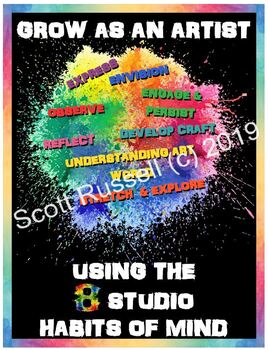

Applying past knowledge to new situations.Thinking about thinking (metacognition).Listening with understanding and empathy.Thinking and communicating with clarity and precision.

The 16 Habits of Mind identified by Costa and Kallick include: When listening intently, for example, one employs flexibility, metacognition, precise language, and perhaps questioning.

Rather, clusters of such behaviors are drawn forth and employed in various situations. These behaviors are seldom performed in isolation. These Habits of Mind are what intelligent people do when they are confronted with complex problems. Habits of Mindįollowing are descriptions and an elaboration of 16 attributes of what human beings do when they behave intelligently (see “16 Habits of Mind”). These characteristics have been identified in successful mechanics, teachers, entrepreneurs, salespeople, and parents - people in all walks of life. Scientists, artists, and mathematicians are not the only ones who demonstrate these behaviors. Research in effective thinking and intelligent behavior indicates that there are some identifiable characteristics of effective thinkers. Finally, it leads individuals to reflect on, evaluate, modify, and carry forth to future applications their learnings. It requires a level of skillfulness to employ and carry through the behaviors effectively over time. It includes sensitivity to the contextual cues in a situation signaling that it is an appropriate time and circumstance to employ this pattern. It means that we value one pattern of thinking over another, and therefore it implies choice making about which pattern should be employed at which time. When confronted with a problematic situation, employ one or more of these Habits of Mind by asking, “What is the most intelligent thing we can do right now?”Įmploying Habits of Mind requires a composite of many skills, attitudes, cues, past experiences, and proclivities. When we draw upon these intellectual resources, the results that we produce are more powerful, of higher quality, and of greater significance than if we fail to employ those patterns of intellectual behaviors. When humans experience dichotomies, are confused by dilemmas, or come face to face with uncertainties, our most effective actions require drawing forth certain patterns of intellectual behavior. We use the term “Habits of Mind” to mean having a disposition toward behaving intelligently when confronted with problems to which we do not immediately know the answers. Not only are we interested in how many answers individuals know, but also in how they behave when they don’t know. We are interested in performance under challenging conditions that demand strategic reasoning, insightfulness, perseverance, creativity, and craftsmanship to resolve a complex problem. Driving reflective practice in the classroom, these videos will be used to stimulate new directions for student thinking and anchor the studio habits of mind for both teachers and students.Įach studio habit of mind link connects to a page with the video, reflections prompts, artist bio, and the advice they wished they would give their middle-school selves.B definition, a problem is any stimulus, question, task, phenomenon, or discrepancy for which we don’t immediately have an answer or solution. These video vignettes profile diverse creative community members modeling studio habits of mind and discussing the beauty of mistakes, the need to struggle, and the satisfaction of making their unique contributions to the world through their art form.`ĪrtCore teaching and learning modules will incorporate these videos and connect students to new voices from the community.

Researchers and educators Lois Hetland, Ellen Winner, Shirley Veenema, Kimberly Sheridan, Diane Jacquith, and Jill Hogan have published extensive resources for educators since 2007 (see bottom of the page for resources). The Studio Habits of Mind framework was developed through the insightful research of Harvard Project Zero. HOW DO ARTISTS USE THE studio HABITS OF MIND?


 0 kommentar(er)
0 kommentar(er)
